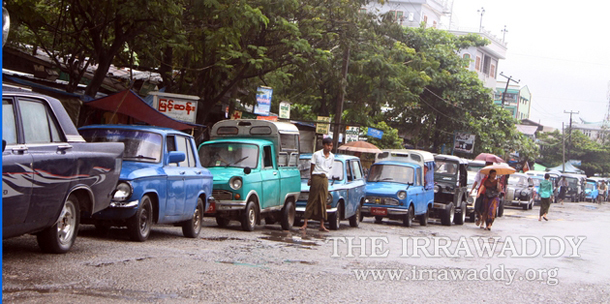Burma is on the edge of an economic boom the like of which Southeast Asia has not seen for many years, the Asian Development Bank (ADB) gushed in April. A little over two months later this optimistic assertion has been toned down substantially, with a senior bank official warning that it could be 30 years before Burma achieves the level of development its neighbour Thailand is currently enjoying.
While the first half of 2012 witnessed an avalanche of over-enthusiastic expectation and prophecy for Burma’s economic revival, the second half has begun with more sober, cautious views on the potential for progress.
The euphoria is giving way to the reality of poor or non-existent roads, decrepit transport, a hopelessly inadequate and broken down electricity grid, poor education, lack of technology and dearth of skills.
“It’s only now, however, that the full extent of the wreckage created by the ‘Burmese road to Socialism,’ which was officially adopted in 1964, is becoming clear,” said The Economist magazine on July 3. “Foreign economists have finally had a chance to run the rule over a country that was until recently almost as isolated as North Korea.”
The new assessment of Burma by the ADB “might sober up some of the over-optimistic investors who have become intoxicated by the ‘potential’ they see everywhere,” says The Economist.
That assessment paints a picture of a country with almost non-existent infrastructure. In addition to a dilapidated and inadequate power supply and distribution grid, mass mobility is nigh impossible because of a hopeless road and transport system.
Road density on average in other Asean countries is 11 kilometres per 1,000 people. In Burma, it is two kilometres per 1,000 people, said the ADB. Indonesia has 250 motorised vehicles per 1,000 people. Burma has 18 per 1,000 people. In Thailand, vehicle density is 370.
“[Burma] needs better connectivity between rural areas, markets and urban centres for more of its people to benefit from the country’s future growth,” said the ADB Vice-President for East Asia Stephen P. Groff after a visit to the country.
“Roads can open up not only opportunities, but access to life-changing services like healthcare and education. At the moment, [Burma’s] transport sector is dramatically under-developed for a country of its size, population and potential.”
A number of potential investor countries in the region have talked about the advantages they see in a large, cheap and well-educated labor force. But according to the ADB assessment, 25 percent of primary schoolchildren—up to 11 years old—do not progress to secondary school. Only 3.74 percent of the national budget is spent on education, and most of that is used just to pay teachers.
“If the money and know-how are available, roads can be built relatively quickly. An education system, however, can take much longer to turn around,” said The Economist, commenting on the ADB assessment.
“The pace of reform ideas has been running way ahead of practicality and there is an urgent need for [President] Thein Sein’s government to step back and make some more sober assessments of what might be termed the good, the bad and the ugly in development ideas,” a diplomat with a Western embassy told The Irrawaddy.
“Some projects might not be in the best interests of the country right now,” said the economic expert speaking on condition of anonymity because of the sensitivity of the subject.
The diplomat was referring to plans by Thailand to develop a port-industrial complex at Dawei, also known as Tavoy, on Burma’s southeast coast.
“Some developments might serve the interests of the country carrying out the work, rather than the country in which the work is being done,” he confessed.
The Bangkok construction firm Italian-Thai Development (ITD) wants to build an oil transhipment port at Dawei plus petro-chemical plants. However, most if not all of this would benefit Thailand rather than Burma.
“The Bangkok government is under pressure to relocate Thailand’s petrochemicals industry which is concentrated just south of the capital and poses health and safety problem, as well as public anger,” energy industry consultant Collin Reynolds told The Irrawaddy. “The problem was amply illustrated by a refinery fire last week.”
Thailand would also benefit from having its oil imports from the Middle East routed quicker via the Indian Ocean and piped overland from Dawei, rather than being shipped the long route via Singapore and the Gulf of Thailand.
Burmese unease about Dawei has been highlighted firstly by Naypyidaw’s refusal to allow a huge coal-fired power station to be built there, and secondly by last week’s announcement by ITD’s Burmese business partner, Max Myanmar Group, that it was quitting the project.
But questions are being asked by international NGO groups as to why the Burmese government, having halted a major Chinese hydro-electric dam project on the Irrawaddy River, now appear to be green-lighting others on the Salween.
According to the Electricity Generating Authority of Thailand, one of the development partners seeking to build large dams on the Salween, the Burmese Ministry of Energy has resumed discussions on prices for electricity which would be sold to Thailand.
“Burma is so desperately short of electricity that many hoped for development projects could be stymied,” said Reynolds.
Groff says Burma’s agricultural sector has “waned under the weight of underinvestment” and suffers from a failing and inadequate irrigation system. It should and could be different, he said. Burma ought to become the international bread basket it once was.
But investing in new roads and irrigation and oil and gas is not the first priority, says Groff. Burma needs to invest in its “most valuable natural resource, its people, to ensure the country develops its rich natural capital without sacrificing it.”
The Economist also expresses concern about the still uncertain politics at the root of Burma’s reform. “It should worry those reformers within the Myanmar government who hope that they can justify the current program of democratic reform to the hardliners with promises of a quick economic fix,” said the magazine.

















